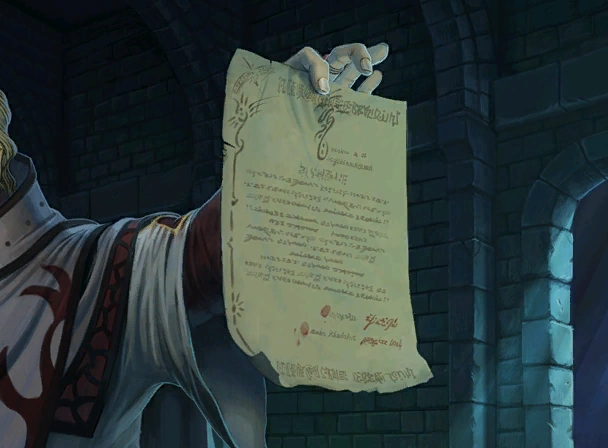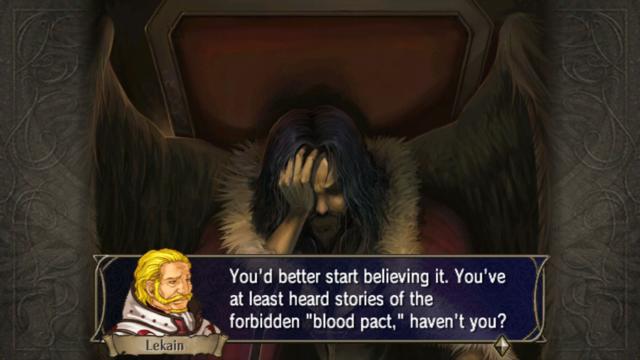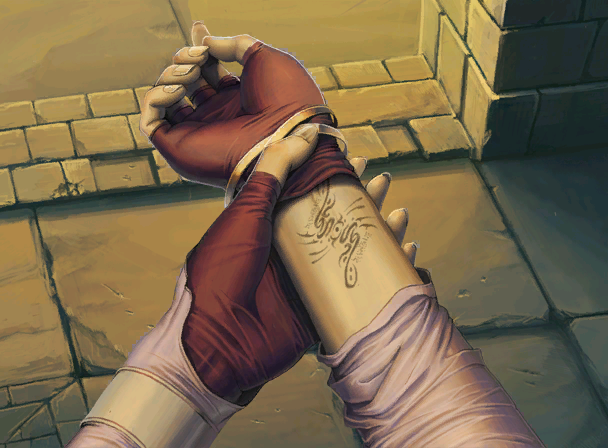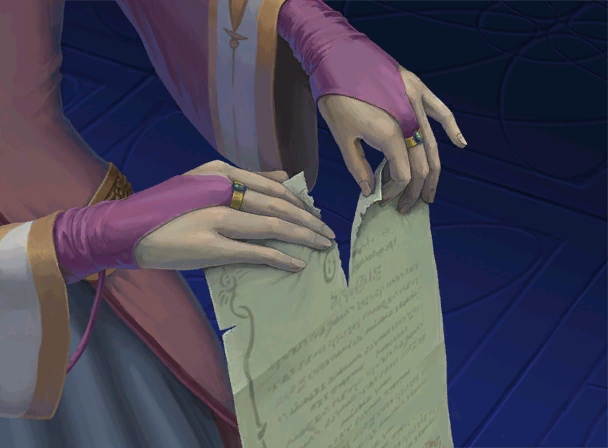-> Special mentions for Naesala, Ashnard, Pelleas and Micaiah
Evil Overlord Darius Pent: From what I understand, critics of the Blood Pact plot device take two major offenses with it--That it feels contrived and is not a convincing motivational factor, and that the Dawn Brigade characters make the worst-possible decision on how to react to it.
I have read many arguments about the Blood Pact, and usually people who feel sour about it comment about how it makes no sense that a magic written on a piece of parchment could enact such a vague threat--a “plague” impacting a ruler’s people. As someone who has studied some of the older literature and lore that Fire Emblem games always borrow from, I have never had a problem with the magical powers of the Blood Pact. This is because the written magic fits within the Fire Emblem franchise’s established realm of magical possibilities, which I will discuss after defining the kinds of magic systems.

While many gamers, anime fans, and armchair movie critics may prefer a more sharply-defined magical system with strict rules and cause-effect relationships, like Fullmetal Alchemist and Avatar: The Last Airbender, this “hard rules” magic system concept is more a modern phenomenon in fiction. Classic myths and old legends frequently make use of magic, but have much more ethereal rules for them, as with the classic Lord of the Rings and its more modern spiritual successor, Dungeons & Dragons. (I would argue as an aside that it is the proclivity of the stories we are most familiar with to involve vague magic systems that creates such an appeal for the magic systems of FMA and Avatar.) Fire Emblem constantly draws from all kinds of mythologies, but most often from Arthurian and Norse legends--both of which follow “loose” rules regarding magic, where the power of language can change reality. In Arthurian legend stories, if a prophet or a witch utter a curse at someone, the intent of their words comes to fruition. The power of words was a well-understood concept to the original audiences of these stories. Given the borrowing from Arthurian Legend in Tellius (Sir Gawain and the Green Knight, if you need an example), it is not unreasonable to see a similar concept of magic words creating a curse in Radiant Dawn. Bringing the concept back to Fire Emblem’s own internal lore, it is entirely reasonable for books to be the source of spells. After all, mages read from tomes to cast their Wind, Fire, and Thunder spells. If the Blood Pact seems contrived, it is only because it was not explained punch-by-punch in concept. Path of Radiance had already sown the seeds of the Blood Pact concept with Naesala’s and Ashnard’s hinted sudden ascendance to power. The power of words had already been established in the Forest of Serenes with the Galdr of Rebirth. It is my opinion, therefore, that those who do not find the Blood Pact a believable magical concept are being sticklers for a hard-magic rules system that Fire Emblem has never truly adhered to. (And, that those who are Harry Potter fans who insist the Blood Pact doesn’t make any sense should probably question their HP fandom.)
(For a fuller explanation of the hard/soft magic system concept, see Hello Future Me’s videos analyzing literary & anime examples.) As for how the Blood Pact targets a ruler’s people, one could argue it enacts akin to the Familicide spell from Dungeons & Dragons, in which the magic seeks out all beings who share blood with or are related to the target and kills them. In the Medieval world of Tellius, countries are pretty segregated, with each Laguz tribe living separately, and even the Beorc nations tend to stick together as a people group. The magic could seek out those in the vicinity of the Pact-breaker and spread like a wave over the country, and most of the inhabitants would be affected. After all, the Pact is literally set in blood, so the magic already knows what to seek if the contract is broken.
The second major problem Blood Pact critics often have is that the Dawn Brigade epicly flubs its decision to continue fighting Crimea and the Laguz Alliance instead of joining them to smash Begnion. The Blood Pact only kills one or two a day and then doubles it. Surely losing 100 or so people is not a big deal--just wave the white flag, invite Ike and his mercs over to your castle, chug some booze, then kick Begnion in the pants in the morning… Much better than fighting to the death army-to-army when you could be fighting Begnion, right?
The main flaw in this would-be argument of pragmatism is that it comes from the perspective of someone who lives in a globalized society. It’s no big deal to interact with people from all over the world and to befriend them. Even if your country was at war with theirs a few years ago, you might not agree with the decision your respective leaders made and could manage some peaceful interaction with that person.
For anyone who missed the memo, the Fire Emblem games do not take place in a globalized society. In the words of NoA’s Bill Trinen of the localization team, Fire Emblem is “Japan’s idea of Medieval Europe.” That means nationalism and feudalism exist in full force. And what continent better demonstrates these ideologies than Tellius? The nations are formed by respective people groups, some of which isolate from those that differ from them, and each people group feels loyal to their own and shuns the “others” until Ike comes along to challenge discrimination of Beorc, Laguz, and Branded. Even then, change is gradual, and each nation is still ruled by a single king or queen (except Begnion, which has a faux-democracy-actually-aristocracy-with-a-spiritual-leader-figurehead thing going for it). When nations war, it’s literally people group against people group, Us versus Them, to the same degree as the World Wars.

Crimea and Daein? They’re not friends. Not even pen pals. They spilt one another’s blood a mere three years before this Blood Pact thing.
Trying to make nice and be buddies is far from anyone’s mind. Except Sothe’s, because he’s Ike’s biggest fanboy outside of the Greil Mercs.
On top of that, this alliance that Daein is supposed to join against Begnion is the same one that has been running with its tail between its legs for the past few chapters because Zelgius kicked Skrimir’s tail. You know what? Joining the losing side to fight the almighty Begnion Empire is sounding better by the second. At the risk of sounding like this is a Straw Man argument, my point is that the “simple solution” is not so simple. And Daein trying to solve things on its own is believable, given the story world… and actual Earth history.
Because let me tell you, Germany’s Kaiser Wilhelm II makes Micaiah’s & Pelleas’s decision look BRILLIANT. (Make allies with France or Russia or literally anyone besides the crumbling Austrian Empire? NAH FAK ENGLAND THREE FRONT WAR YOLO SWAG. KEEP TORPEDOING THOSE MERCHANT SHIPS, LET THE USA JOIN THE ALLIES, FAK EVERYTHING!!!1~!!1one!)
Nationalism says “nuts” to working with your nation’s hated enemy. And even barring nationalism, no self-respecting nation just turns over and begs their hated rival for help. Unless the Koreas shaking hands and being besties is the fanfiction you’re reading. Stick that wall-of-text in your pipe and smoke it 420BlazeIt style.

Marm: So, Daniel’s epic response covers just about everything, but I’ll also add that people underestimate how long this conflict goes for, or how long it’s expected to last for, when considering Micaiah’s and Pelleas’ position when picking a side in the war. The blood pact kills people exponentially when it isn’t being respected. Wars don’t last a couple weeks, you know. They last months, years. Without knowing how long the conflict will go for, they can only try to obey orders and keep their losses to a minimum. It’s entirely unreasonable to think they would do otherwise. Think back to the “Plague” Tanith mentions when she speaks of Ashnard in PoR. She mentions a good percentage of the Begnion / Daein populations were lost, indiscriminately, over the span of just a year.
Alan: Blood Pacts, like many of the things we see come to light in Radiant Dawn, are seeded throughout Path of Radiance’s narrative. In chapter 18, Crimea Marches, Ike has a base conversation with Tanith where they talk about how Ashnard came to power. They speak of some sort of plague that killed off many citizens of Daein and everyone in the royal line between Ashnard and the crown. In Path of Radiance’s endgame, Ashnard tells Bryce that it was by his hand that everyone between him and the throne, claiming that their deaths that were supposedly caused by the plague were rather caused by his direct actions, which they were, because he used a blood pact for it.

So first let’s talk about the first aspect: its believability. DRP already covered this point extensively, but I’ll add on that its additional relevance to PoR in regards to Ashnard and Naesala strengthens this even further (Don’t worry, I’ll go over specific characters soon).
As for the second aspect, there’s no question that the use of blood pacts accomplishes a hell of a lot for the story. It sets up conflict, and alongside it, a thematically relevant dichotomy (balance vs extremism) that it uses to send a bigger and more important message. It also allows for an incredible degree of character development for Micaiah, Sothe, and Pelleas, something that would’ve been nowhere near as strong had the conflict been done in some other manner.

Onto characters in particular, starting with Ashnard. I would assume the arguments about blood pacts ruining his character would be on two particular fronts: that it doesn’t make sense for someone who feels so strongly about how people should be able to enjoy the value of their own power and what it can grant them to use an outside power like a blood pact, and that it contradicts what he told Bryce in PoR’s endgame, that everyone in line to the throne died by his own hand. To refute the first is easy: it’s clear that Ashnard has no problem with using an outside power. In PoR he was hellbent on using the medallion’s power for almost the entirety of the game. He seems to believe that when you take the power of something else, it essentially is just an extension of your own. The use of a blood pact wouldn’t really be any different from trying to use the medallion, or his use of blessed armor or his blessed sword, Gurgurant. What he told Bryce in PoR’s Endgame, about everyone in line to the throne “dying by his own hand”, isn’t incompatible with the use of blood pacts either, especially considering what I just mentioned about his feelings on tools of power. Better yet, someone’s critique of blood pacts actually made me realize something about Ashnard that makes a hell of a lot of sense. On one of my streams someone brought up to me the unlikelihood of the blood pact killing the exact people who were in the line of succession before its killings got out of hand, and I realized they were completely right. The conclusion I ended up coming to is that Ashnard used the blood pact to imitate a plague, so that he could kill those ahead of him personally under its guise. This would be even more consistent with Ashnard telling Bryce that they died by his own hand, while also solving the probability issues that would arise with them dying purely to a blood pact.
Pelleas’ and Micaiah’s character are both GREATLY benefitted by their blood pact. Pelleas is just a normal, everyday guy, thrown into a position of leadership when he is completely inept. Yet despite his weakness and inexperience, he acknowledges his shortcomings and vows to do his best regardless. He has a strong sense of duty to his people even though he has no idea how to really lead them. It comes to the point where he is willing to sacrifice himself to save his people, without hesitation. The situation he finds himself thrust into brings out how much he really cares about his people.

The same goes for Micaiah. Rather than struggling with inadequacy for her role, her struggle is more moral in nature. She knows what she is doing is wrong, but her loyalty to the Daein people overshadows it. She puts her entire moral compass on the line to protect them. In her own words: “If that's what it takes to be just, then I want nothing to do with justice. I'd rather be hated and feared like Mad King Ashnard. I'd rather the dark god take my soul. I'm going to save my people, Sothe. If the rest of the world paints me as a beast to be reviled and hated, so be it.“
Naesala is a bit harder to interpret, and is something that even I still actively think about in order to try and fully understand. The conclusion I’ve come to for now is that Naesala in PoR, being under the blood pact, chose to cut himself off from others so as to make it easier to protect his people. He was similar to Micaiah or Pelleas in that loyalty to his people, I suppose. He succeeded in giving up his moral compass, which is why he remained self-serving even towards his own allies and friends, his fellow laguz kings. When Reyson tells him that Leanne is alive, his demeanor changes. Notice that after that, he no longer battles against Ike’s group, and goes so far as to save Leanne (admittedly due in no small part to Tibarn telling him to) and to stay and fight against Daein at her request. Leanne cracked his facade, and in RD, when Begnion really starts to use his blood pact against his allies, his facade fully breaks. His guilt is outwardly visible, and the consequences of him being under its grip are far more severe alongside it.


It makes sense to me that Radiant Dawn would have Naesala commit an act of treachery without being evil. One of the main ways a Fire Emblem story keeps a character sympathetic while also committing heinous acts is to usually strip that character of their agency. Lyon is a prime example of this. Alvis is another example of a character who was blackmailed into doing what he did. So it seems to me that the writers wanted Naesala to betray the Laguz Alliance without turning evil. The answer? Force him to do it via Blood Pact. In light of everything we’ve discussed about the Blood Pact it makes perfect sense to me for this to be the avenue the story would pursue.
Some people also take issue with the fact that Naesala inherited the Blood Pact. Again this makes perfect sense to me since Naesala is supposed to be a shrewd and crafty character. There’s no way that someone could feasibly trick him into signing one.
No comments:
Post a Comment